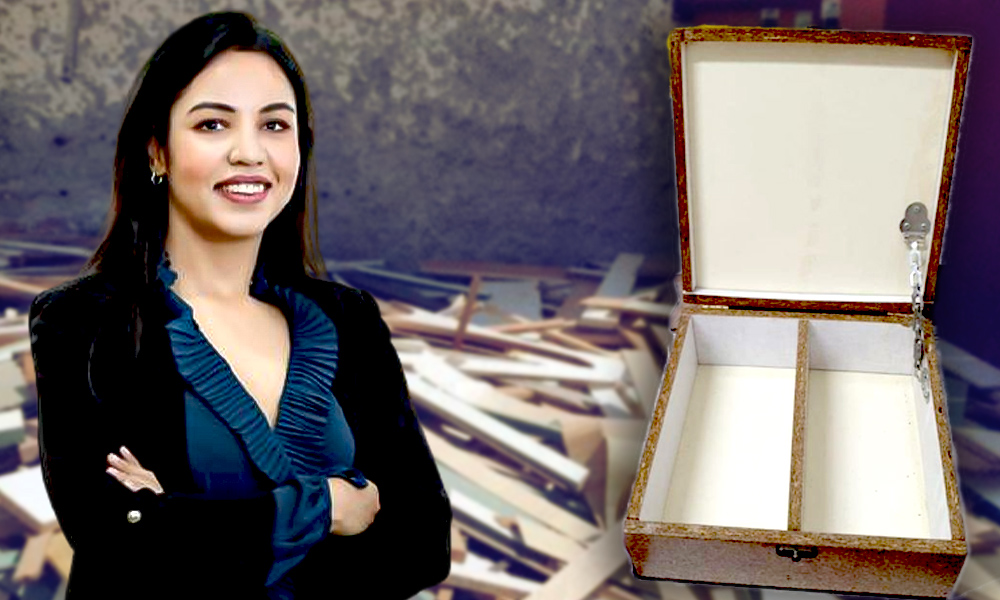
Representational
Can Waste Be Converted To Furniture? This Delhi-Based Entrepreneur Is Making It Possible
Delhi, 26 Feb 2021 11:02 AM GMT
Editor : Prateek Gautam |
A free soul who believes that journalism, apart from politics, should stand for social cause and the environment.
Creatives : Rajath
A free spirit who find meaning in life with the virtue of creativity and doing job par its excellence, animal lover and traveller by heart.
Pritika Singh is a social entrepreneur who launched Mohh, a start-up, that makes use of waste to make eco-friendly furniture.
Delhi-based Pritika Singh is a social entrepreneur who launched a start-up that makes use of waste to make eco-friendly furniture. Simply put, it recycles discarded material to create a modern and sustainable furniture collection.
The startup, Mohh, which is one-and-a-half-year-old is backed by a creatively talented team of eight members and staff at the manufacturing unit who believe in crafting exceptional, quirky as well as environmentally responsible furniture designs. The team claims that using the discarded matter of various shape, size and texture help them to explore their imagination to create durable, aesthetic and socially beneficial products.
Speaking to The Logical Indian, Pritika said, "We wanted to get into this sector not just because 'sustainability' has suddenly become the buzz word! It stems more from a desire to direct efforts into adding value to the consumer's life without negatively impacting our surroundings. Innovation has to be the second driving factor."
"When we look at the furniture sector, there has not been much exploration and innovation which has ended stagnating the industry. We wanted to begin by trying to make smaller changes such as using scrap, or leftover-metal or wood pieces. Initially, it was personally driven and I was lucky enough to find the people who believed in pushing the envelope and also do something for the environment," she said while explaining the reason for taking up such a project.
An alumna of King's College London, Pritika said that as an entrepreneur, it was crucial for her to use her education and knowledge to create something of value which also eliminates any possible damage to the environment. Since the brand aspires to scale up and get into mass production, it becomes significant to keep the processes and the raw materials green.
Answering what goes into creating the right product, Pritika said, "It begins with a lot of research. With a lack of sufficient literature, case studies or aspirational brands to look up to that could simplify the process, the research becomes the foundation. We follow two stages.
The first is to find out and connect with the small start-ups, big companies that produce sustainable materials to study the properties and appropriate usage. In the second stage, getting samples to examine what it can be used for and then creating pieces. It is the same as creating a prototype that is consumer-centric."
Talking about procuring the material, she said, "There are some industries which can provide you with the required raw/waste material for free but right now the process is in a nascent stage so we are exploring opportunities. We make sure that the scrap that is generated from our factory is utilised in some or other form. It might also be ideating to create smaller accessories to creatively make use of the left-over.
For instance, a metal sheet or wooden planks of some dimension that would end up as discarded waste is consciously put to use. Recently, while researching we came across eco-boards that can be made utilising the waste tetra packs. Once these tetra packs are used, they cannot be processed anymore and usually ends up in landfills. Now, these tetra packs can be broken down and used to make a board."
According to the entrepreneur, the most noteworthy aspect of using recycled materials for furniture is that it acts as an alternative to wood. To create something from an alternative, a standardised process is followed that ensures durability. It helps to stop unnecessary deforestation for the want of wood. She said that the carbon footprint created from a sustainable alternative is comparatively lesser.
"A change in the mindset in the need of the hour. People desire to beautify their houses with high-quality furnishings and thus it becomes absolutely necessary that a piece of furniture created out of scrap should be well-crafted that consumers take pride in owning and placing in their homes.
It is not an easy adaptation. Expecting people to adopt the idea of owning sustainable furniture especially because it entails a premium price is not easy. Right now, it is more expensive to create sustainable products and this is across industries. We tried to have a balance between having sustainable premium products with the ones having mass-appeal."
On being asked about the challenges and attaining profitability, Pritika said, "The questions regarding quality, longevity and durability are the most common ones that need to be clarified. It is a continuous dialogue with the consumers that besides being sustainable, the product has a great design and is going to last. Acquiring the right customers and retaining them is difficult."
She feels optimistic about the future of environmentally-conscious companies. Pritika said that as and when they planned to scale the operations, they would find investors who wanted to put their funds into firms that were mindful of the environment. She also shared that the furniture industry in the online space was expected to grow monumentally in the next five years so there were efforts being put in to organise and expand the industry.
Also Read: 'Run To Empower': Adidas Launches 'Hi-Energy Challenge' To Support Rural Sports Talent
 All section
All section














